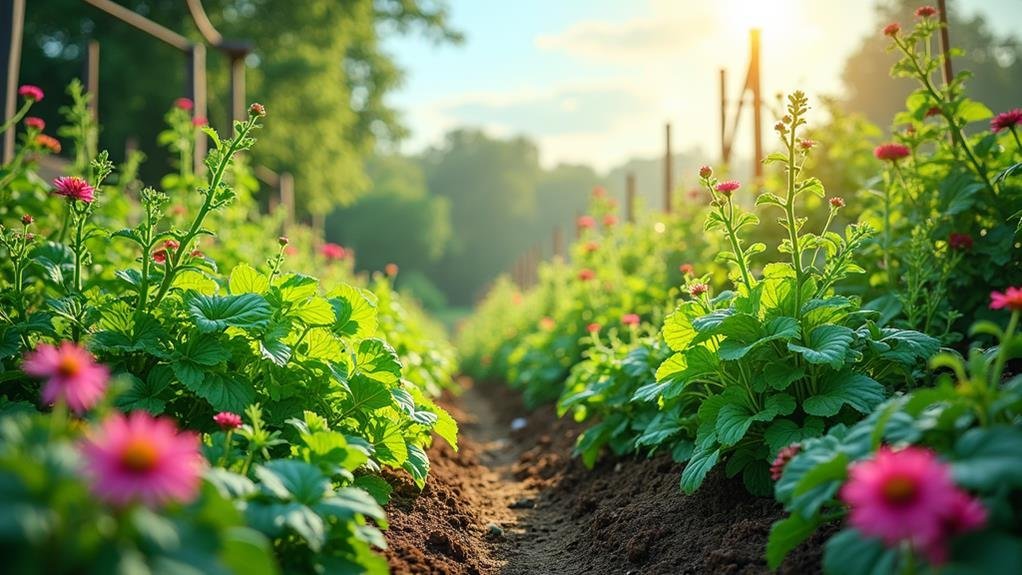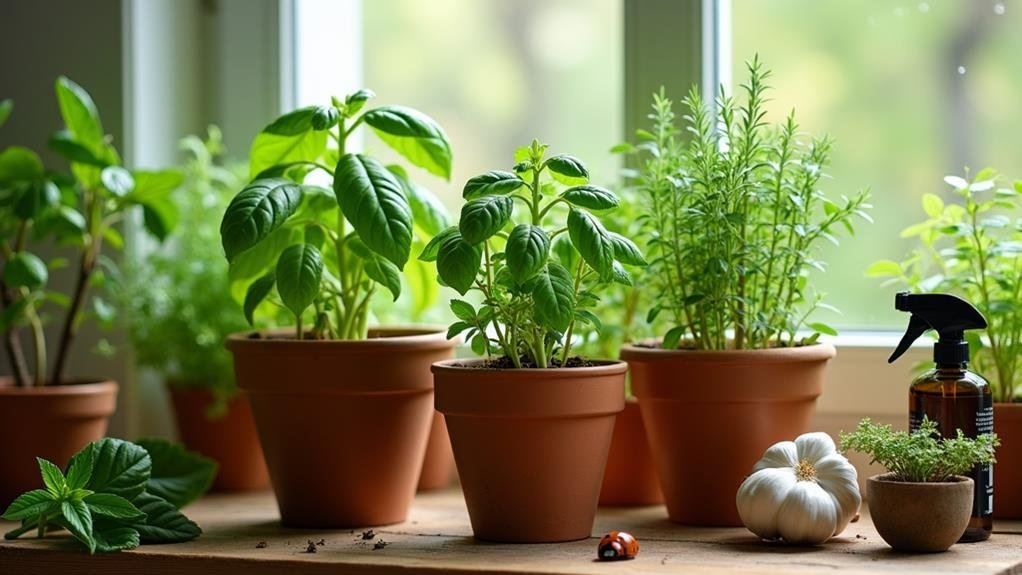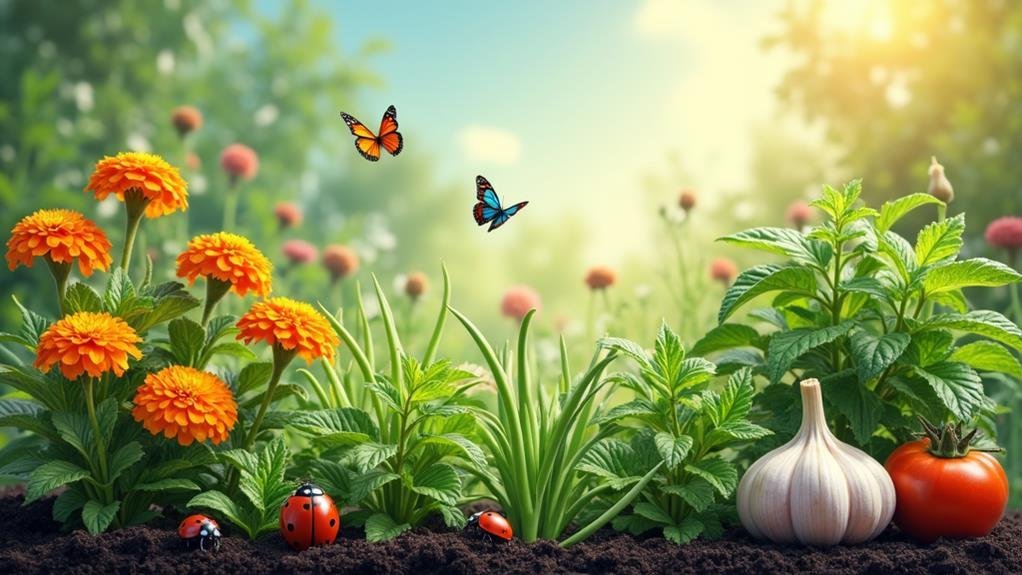When you're growing your own vegetables, dealing with pests can be frustrating, but it doesn't have to be a losing battle. There are several organic pest control methods that can keep your garden thriving without relying on harsh chemicals. From using neem oil to attract beneficial insects, each method offers unique advantages. If you're curious about how these techniques can transform your gardening experience and guarantee a healthier harvest, you might want to investigate the specifics of each method.
Neem Oil Treatment

Neem oil treatment is one of the most effective organic solutions for managing pests in your vegetable garden. Extracted from the seeds of the neem tree, this natural pesticide disrupts the life cycle of various pests, including aphids, spider mites, and whiteflies.
You'll find it particularly useful, as it works by interfering with their hormones, preventing them from growing and reproducing.
To use neem oil, simply mix it with water and a few drops of mild soap to help it adhere to the plant surfaces. Spray this mixture on your plants, covering both the tops and undersides of the leaves.
It's best to apply it in the early morning or late afternoon to avoid harming beneficial insects and to prevent leaf burn from the sun.
While neem oil is generally safe for plants and humans, you should always test a small area first. It's also important to reapply every few days, especially after rain or watering.
With consistent use, you'll notice a significant reduction in pest populations, allowing your vegetable plants to thrive.
Diatomaceous Earth
Another powerful organic pest control method is diatomaceous earth (DE), which can effectively manage a wide range of pests in your vegetable garden.
Made from the fossilized remains of tiny aquatic organisms called diatoms, DE is a natural, non-toxic powder that works wonders against soft-bodied insects like aphids, slugs, and beetles.
To use diatomaceous earth, simply sprinkle a thin layer around your plants. When pests come into contact with the powder, it damages their exoskeletons, leading to dehydration and eventual death.
Just remember to reapply after rain or watering, as moisture can diminish its effectiveness.
One of the best things about DE is that it won't harm beneficial insects like ladybugs and bees if applied carefully.
However, be cautious not to inhale the dust, as it can irritate your lungs. Wearing a mask while applying it's a smart move.
Using diatomaceous earth not only helps you keep pests at bay but also supports your commitment to organic gardening.
Companion Planting
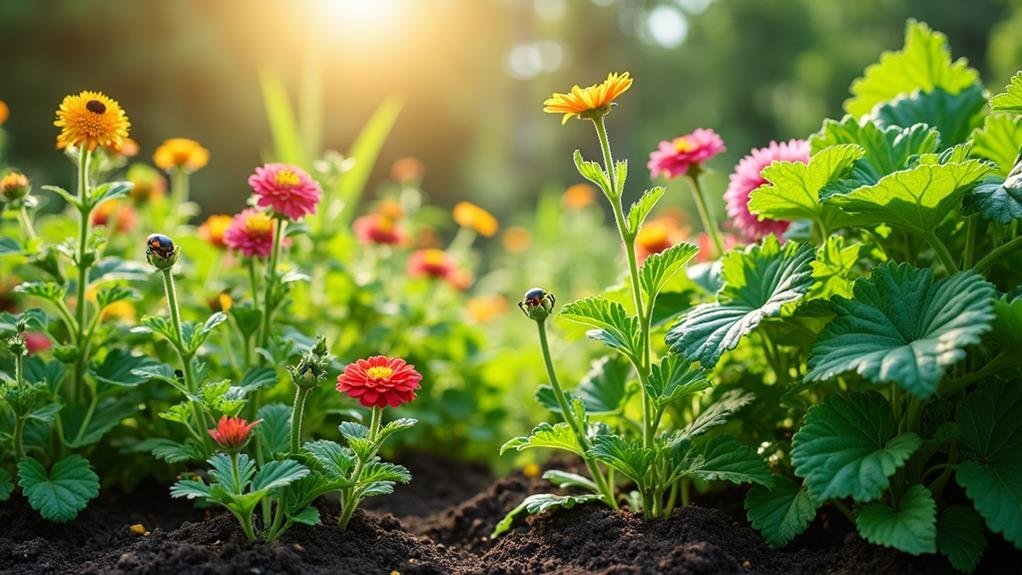
Companion planting brings together the benefits of different plants to improve your vegetable garden's health and productivity. By strategically placing certain plants near each other, you can boost growth, deter pests, and even amplify flavor.
For instance, planting marigolds alongside tomatoes can help fend off nematodes and whiteflies, while basil can elevate the taste of your tomatoes when grown nearby.
You'll also find that some plants can attract beneficial insects. For example, planting dill can draw in ladybugs, which feast on aphids.
On the flip side, be cautious of incompatible pairings. For instance, avoid planting beans near onions, as they can hinder each other's growth.
When planning your garden, think about the relationships between different plants. Research combinations that work well together, and create an ecosystem that supports your vegetables.
It's like a little club for your plants, where everyone helps each other thrive. With a little experimentation, you'll uncover what combinations yield the best results.
Homemade Insecticidal Soap
Homemade insecticidal soap is a simple yet effective solution for tackling pesky garden pests without resorting to harsh chemicals. You can easily make it at home using just a few common ingredients.
Start with a mild liquid soap, like castile soap, and mix about 1 to 2 tablespoons with a quart of water. This mixture will help suffocate soft-bodied insects like aphids, spider mites, and whiteflies.
Before you spray, test the solution on a small area of your plants to verify they won't be harmed. Once you've confirmed that your plants are safe, spray the affected areas thoroughly, covering both the tops and undersides of the leaves where pests often hide.
It's best to apply the soap in the evening or on a cloudy day to prevent leaf burn from the sun.
You should repeat this application every few days until you notice a significant reduction in pests. Keep in mind, though, that homemade insecticidal soap works best when used as part of an integrated pest management approach, combining it with other organic methods for ideal results.
Your garden will thank you!
Beneficial Insects
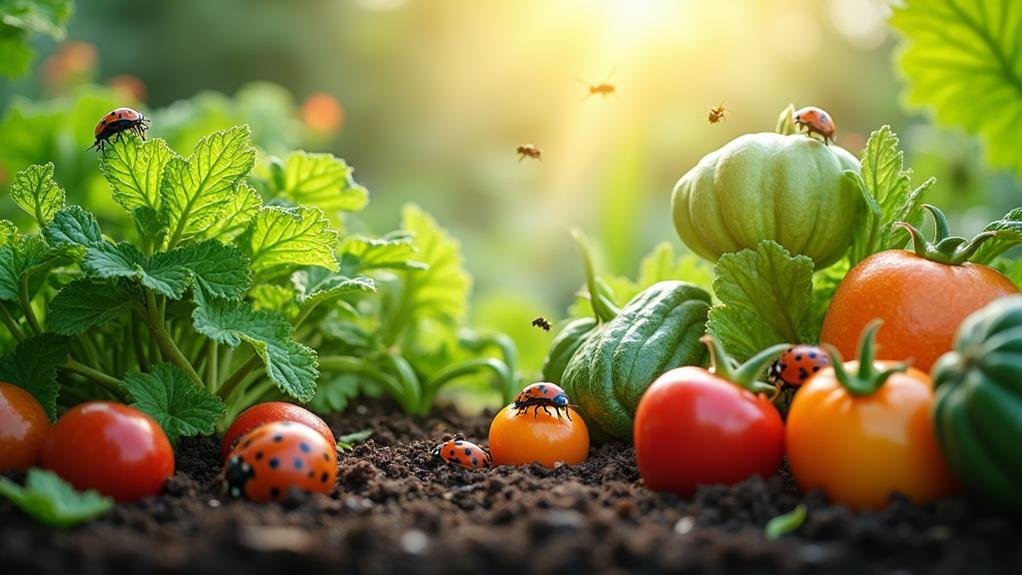
Beneficial insects play an essential role in maintaining a healthy garden ecosystem. These tiny allies help control pest populations naturally, so you won't need to rely solely on chemical pesticides. Ladybugs, for instance, are known for their appetite for aphids, while lacewings munch on a variety of soft-bodied pests. Encouraging these insects to visit your garden can greatly reduce the damage caused by harmful invaders.
To attract beneficial insects, consider planting a diverse range of flowers and herbs. Plants like dill, fennel, and yarrow provide nectar and pollen, making your garden a welcoming place for these helpful insects.
Additionally, creating habitats with small piles of leaves or stones can offer shelter for them.
You can also minimize the use of broad-spectrum pesticides, which can harm beneficial insects along with pests. Instead, focus on targeted treatments that spare your garden's allies.
By fostering a balance between pests and beneficial insects, you'll create a more resilient garden. Remember, a thriving ecosystem doesn't just mean fewer pests; it means healthier plants, too!
Garlic and Pepper Spray
Encouraging beneficial insects can greatly improve your pest control efforts, but sometimes you'll need a little extra help. That's where garlic and pepper spray comes in. This powerful concoction not only acts as a deterrent for pests but also is easy to make at home.
To create your spray, you'll need a few cloves of garlic, some hot peppers, and water. Blend the garlic and peppers along with water, then strain the mixture to remove solid pieces. Pour the liquid into a spray bottle, and you're ready to go!
When you spray this mixture on your plants, the strong scent and heat will repel common pests like aphids, spider mites, and whiteflies.
It's best to apply this spray in the early morning or late afternoon to avoid sunburning your plants. Remember to test it on a small area first, as some plants may be sensitive to strong mixtures.
Reapply every few days or after rainfall to maintain its effectiveness. With garlic and pepper spray in your toolkit, you'll have an organic pest control method that's both simple and effective, helping you keep your veggies safe and thriving!
Crop Rotation Techniques

Crop rotation techniques are an essential part of organic pest control and can greatly boost the health of your vegetable garden. By changing the location of your crops each season, you disrupt the life cycles of pests and diseases that thrive in specific plants. For example, if you planted tomatoes in one area last year, consider planting legumes, like beans or peas, in that same spot this year. This not only helps control pests but also enriches the soil.
When planning your rotation, think about grouping plants with similar nutrient needs. Rotate heavy feeders, like corn and peppers, with lighter feeders, such as lettuce and radishes. This approach guarantees your soil remains balanced and productive.
It's also helpful to keep a record of your planting schedule. This way, you won't accidentally plant the same crops in the same location too soon.
Conclusion
By implementing these seven organic pest control methods, you can effectively protect your vegetable garden without harsh chemicals. Whether you choose neem oil, diatomaceous earth, or beneficial insects, each approach offers unique benefits to keep pests at bay. Remember, a combination of techniques often yields the best results, so don't hesitate to experiment. With a bit of patience and care, you'll enjoy a thriving, healthy garden that's both productive and eco-friendly. Happy gardening!

